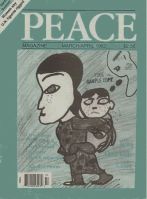
Peace Magazine Mar-Apr 1992, page 5. Some rights reserved.
Search for other articles by various here
In the former Soviet Union, scientists, academics, and cultural workers are facing enormous problems. Workers are coping with deteriorating economic, social and health conditions. Projects are often dropped due to lack of funding. The USSR Academy of Sciences is becoming bankrupt as its structure is being ripped apart by the departing republics. Cultural associations are facing similar problems.
With the seduction of television and misguided notions of the West, some Soviets are now giving up their professions and rushing Westward in search of money. Some educators are even turning over their control to business interests, thereby making the university a private laboratory for profit. If this proceeds further, the search for knowledge will suffer and the "empty head" syndrome will soon be upon us.
All of this will be tragic not only to the Russian and Soviet peoples, but to civilization itself.
What, then, can we do? Why not invite our science academies, our cultural organizations, social organizations, and family groups to establish friendly ties such as that found between "sister cities" or "twin cities." Deans of universities could invite Soviet instructors to lecture and do research for periods of one year or so. The Federation of American Scientists, for example, has recently invited the 150 institutes of the Soviet Academy of Sciences to propose to American institutes in their field that a "sibling" relationship be established akin to that of "sister cities"; the Federation has invited suggestions from American and Soviet scientist to improve scientific contacts and assist Soviet scientists. Canadians ought to do the same.
Actors, ballet dancers, singers could be invited to participate in similar twinnings, thereby allowing for a "win-win" situation for all. The Soviets will benefit by continuing their profession, thereby helping their families and friends back home. Canadians and Americans will benefit by the depth and breadth of Russian cultural, scientific and educational legacy. For example, learning how to think has been an important part of classical pedagogy-and this can only benefit us in the West by giving us balance to our practical business ethics. Soviets will benefit by learning good business practices and the spirit of responsible entrepreneurship. Finally, civilization will benefit by making use of the gifted cultural, educational, and scientific masters that are found in Russia and the Soviet Union.
When the G7 countries are looking for sure ways of assisting the Soviet Union, they ought to actively promote this much less expensive, but more fruitful method of creating new relationships across boundaries.
Koozma J. Tarasoff Ottawa, Ontario
On re-reading Lewis Carroll's Alice in Wonderland
one wonders if we have been down a rabbit hole. Were the last forty years of Cold War not somewhat like Alice's adventures with unreality?
The Cold War appears to be over, but at a recent conference NATO politicians and generals announced that the defeat of communism was the result of the armed strength of NATO. The truth is the opposite: the communist regime was able to maintain its position of power for 40 years by convincing the peoples of the Soviet Union that the NATO forces were planning to invade. The Soviet people, who suffered horrendously during the Second World War, put up with the great hardships and repression of the "Dictatorship of the Proletariat" rather than risking another invasion.
The Cheshire Cat in Alice's Wonderland could be compared to the powerful "Evil Empire" that Reagan warned us about. The Cheshire Cat appeared as a grinning head; the queen ordered "Off With Your Head"; the executioner argued that you couldn't cut off a head unless there was a body to cut it off; the King argued that anything that had a head could be beheaded.
The Cheshire Cat disappeared. The Soviet Empire disappeared.
Now the Cold War is over, perhaps the people of the world can come out of the rabbit hole and recognize that each person is significant and much of the world's leadership (with its absurd belief that military solutions are solutions) is nothing but a pack of cards.
Ross Hermiston Kingston, Ontario

Peace Magazine Mar-Apr 1992, page 5. Some rights reserved.
Search for other articles by various here